I have a table that I need to do an initial update on and then a nightly update on. I have a file name that I need to get values from inorder to update two columns. I come from an Oracle PL/SQL background, and have little experience in SQL Server and T-SQL. I am good with Oracle cursors to traverse tables and understand they are controversial for doing stuff in SQL Server.
My ultimate goal is to provide the users with information on how many of each file type and Water Right type have been processed.
File names look like this:
UPDATE_TO_FILE_STATEMENT_OF_CLAIM_41L_44799_00_2780.pdf
PRELIMINARY_DECREE_STATEMENT_OF_CLAIM_41G_40643_00_1134.pdf
FILE_STOCKWATER_PERMIT_40N_30116114_10437.pdf
UPDATE_TO_FILE_GROUND_WATER_CERTIFICATE_40E_30025354_10399.pdf
From this file name, I need to pull the file type and the Water Right type. There are 4 file types and 20 Water Right types. I could use a Case, but then I have to change the code if they add a file type or a Water Right type. Parsing the names is no easy task either. I have created a table with the codes I will use, what the file name looks like, the description, and whether or not it is a File Type or Water Right Type.
FILE_CD FILE_NAME DESCR FILE_TYPE
----------------------------------------------------------------------------
62GW 62-73_GROUND_WATER_RECORD 62-73 GROUND WATER RECORD WT
CDWR CONSERVATION_DISTRICT_RECORD CONSERVATION DISTRICT RECORD WT
UPDT UPDATE_TO_FILE_ UPDATE TO FILE FT
My plan is to traverse this table and run updates for the initial run. I will also traverse this table and do a single update in a trigger for each record added each night.
This is my code:
BEGIN TRANSACTION
DECLARE @F_type NVARCHAR(2)
DECLARE @F_name NVARCHAR(30)
DECLARE @F_CD NVARCHAR(4)
-- local means the cursor name is private to this code
-- fast_forward enables some speed optimizations
DECLARE c_TUpdt CURSOR LOCAL FAST_FORWARD FOR
SELECT
FILE_CD, FILE_NAME, FILE_TYPE
FROM
PRDECMSTATS.dbo.FileType
WHERE
FILE_CD NOT IN ('OTHT', 'OTHF')
OPEN c_TUpdt
FETCH NEXT FROM c_TUpdt INTO @F_CD, @F_name, @F_type
WHILE @@fetch_status = 0
BEGIN
-- CHECK FILE TYPE
IF @F_type = 'FT' THEN
UPDATE PRDECMSTATS.dbo.FileDetails
SET File_Type = @F_CD
WHERE File_Type IS NULL
AND FileNAME LIKE @F_name || '%'
END IF
IF @F_type = 'WT' THEN
UPDATE PRDECMSTATS.dbo.FileDetails
SET WR_Type = @F_CD
WHERE WR_Type IS NULL
AND FileNAME LIKE '%' || @F_name || '%'
END IF
FETCH NEXT FROM c_TUpdt INTO @F_CD, @F_name, @F_type
END
CLOSE c_TUpdt
DEALLOCATE c_TUpdt
/* need to then traverse for other types, these will need to be corrected by hand at some point */
UPDATE PRDECMSTATS.dbo.FileDetails
SET File_Type = 'OTHF'
WHERE File_Type IS NULL
UPDATE PRDECMSTATS.dbo.FileDetails
SET WR_Type = 'OTHT'
WHERE WR_Type IS NULL
COMMIT TRANSACTION
I expect this to update the 2 columns given the data in the file name.
WILL THIS WORK? Is there a better way to do this?
